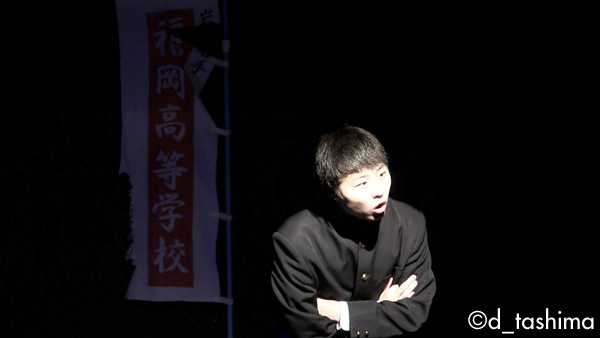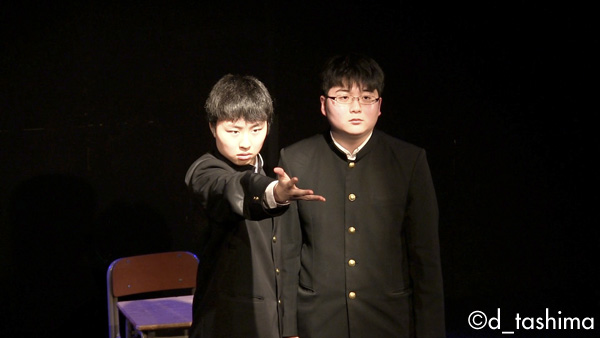The sound of waves is heard in the dark. Dendo enters the rehearsal studio calling repeatedly the name “Tas-san!” He complains that they can’t rehearse because one of the drama club’s female members, Yamashita, isn’t there. Tas-san calls back from the sound room, “Practice what you can without her.”
There is the singing of cicadas. Dendo begins speaking his lines. For this high school drama club with just two male and one female student members they chose the play Hogiuta (Ode to Joy) about a post nuclear war world written by the playwright Soh Kitamura for a two male and one female cast. We hear about how it has been decided to stage it as a one-man play because Tas-san’s specialty is as a sound technician and the girl Yamashita hasn’t shown up and about Dendo’s upbringing to the age of 13 in the Kansai region of western Japan.
The scene changes to the school’s announcement broadcasting room. As a special program commemorating the 110th anniversary of the school, each of the clubs will take turns doing the school’s noon announcements and music broadcast, and the drama club is chosen to be the first. For this broadcast, Dendo calls himself DJ Ryo and gives a skillful introduction to the drama club’s activities. He talks to Tas-san while the music is playing but gets no answer.
Dendo’s broadcasts continue on the second and third days with his introductions of the drama club and excerpts from the play Hogiuta that he recites taking on the roles of two characters. In the music breaks he talks to Tas-san but never gets an answer.
The scene shifts to the drama club’s room after school. We learn that the book of
Hogiuta
was found in this club room when it was being cleaned up after the earthquake and that Tas-san had been at the home of relatives in Rikuzen Takata (a town where many lives were lost in the tsunami) for a Buddhist memorial service on the day the tsunami struck.
On the fourth day of the broadcasts Dendo recites a poem titled “
Guruguru
” written by a former drama club member. Line of the poem says, “Sometimes it feels like everything is pressing in on me.”
It is Sunday night. Dendo talks about his experience helping the employees of his family’s construction company clear rubble of homes destroyed in the tsunami. As if Tas-san were standing in front of him, Dendo speaks about the anger he felt when, in the face of the terrible scene of [the tsunami’s] destruction, he recalled the words of the drama club’s faculty advisor, Mr. Okabe, who had once said, “All situations are to be enjoyed,” and how it had brought him fresh energy and courage the moment he got the idea to complain to Mr. Okabe about it later.
It is now the last day of drama club’s broadcasts. With Dendo’s announcements, we are fast-forwarded through the year following the 3.11 earthquake and tsunami disaster, from April to May to August and December. We hear about events related to the disaster and recovery efforts, we hear that Yamashita has transferred to the English club and that Tas-san has disappeared.
Dendo confesses that he isn’t sure what theater can do for people but the one thing he knows it that he wants to continue doing drama, and he begs Tas-san to return and help him continue. At that moment, Tas-san appears in the broadcast room. The two of them act out the scene of
Hogiuta
about “The Fox, the Bear and the Rabbit.” When the scene ends, Tas-san disappears at the back of the stage. “Tas-san!” shouts Dendo as he dashes madly in search of him, knocking down panels as he does.
Silence. Yamashita appears and asks Dendo to come with her to Tas-san’s funeral, but he refuses. Stars shine in the quiet of the night.
“This is all the more I can do! I am the drama club of Iwate Prefecture’s
Fukko
(abbreviated nickname of Fukushima Koko high school)! Iwate Prefecture’s
Fukko
! (
fukko
also meaning recovery from disaster) Iwate will recover from the disaster!” shouts Dendo. Then, with all the frustration of his perceived helplessness and insignificance and all the overwhelming conditions existing in the society wrapped together in his heart, he screams out a rendition of his high school’s school song.




